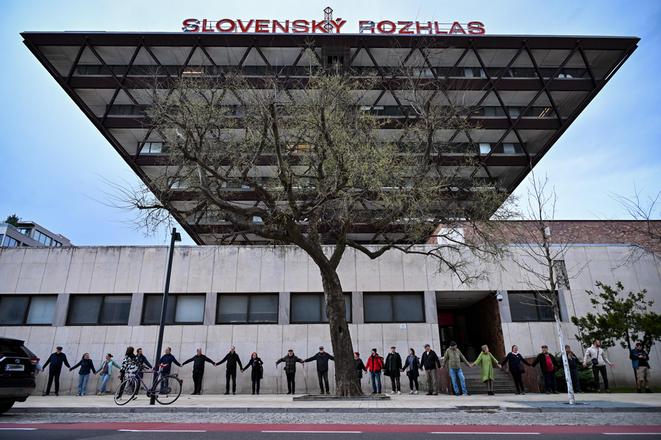Slovakia has fallen 12 places in the latest global media freedom ranking published by Reporters Without Borders (RWB), ending in 29th place.
Pavol Szalai, who heads the NGO’s EU and Balkans Office, told the Sme daily that politicians have been turning journalist into targets, noting this was especially visible during last year’s parliamentary elections. As a result, threats to journalists in the online space have intensified.
Slovakia’s position deteriorated by all criteria, chiefly due to developments since the election of the Fico government in autumn last year.
“Instead of answering journalists’ questions about issues of public interest, government officials have been attacking critical journalists,” the RWB official underscored, as quoted by the Sme daily.
The government has also cut the budget for the current public broadcaster, RTVS, by 30 percent.
STVR bill had no effect on the ranking, yet
The ranking came out more than a week after the Slovak government okayed a bill that will abolish RTVS and replace it with a government-controlled television and radio broadcaster, STVR. The initial bill, which has been amended, was presented to the public in early March.
2024 Reporters Without Borders ranking
1 - Norway
2 - Denmark
3 - Sweden
____
17 - Czech Republic
29 - Slovakia
32 - Austria
47 - Poland
61 - Ukraine
67 - Hungary
____
178 - Afghanistan
179 - Syria
180 - Eritrea
Source: RWB
However, Slovakia’s current RWB ranking did not take into account this latest move.
Still, the NGO notes that some European leaders, including Slovak Prime Minister Robert Fico, of the ruling Smer party, and Hungarian Prime Minister Viktor Orbán, are continuing to threaten the media and journalists despite the EU adopting its first European Media Freedom Act.
Hungary, Slovakia's southern neighbour, is one of the worst-ranked countries in the EU, in 67th position. Across the union, press freedom was judged worst in Malta and Greece. Nevertheless, all three of these countries moved up in the ranking.
Poland also climbed the ladder, while Czechia fell.
Kuciak retrial also worries RWB
Szalai went on to note that the 2018 murders of journalist Ján Kuciak and his fiancée Martina Kušnírová remains unsolved. Fraudster Marian Kočner, who was accused of masterminding the killings, was acquitted during a retrial last year. Another reason why Slovakia’s position worsened is that the investment group Penta, which already owned the popular tabloid daily Plus 1 Deň, bought the country's other main tabloid, Nový Čas, last year. Nový Čas has the largest circulation of any Slovak newspaper.
The coalition’s threat to stop using private media that it perceives as critical towards it for state advertising – it has specifically identified the most popular TV channel, TV Markíza, as such – also contributed to Slovakia’s 29th place in the ranking.
The NGO also cites deepfakes as a tool of influencing elections, giving the audio deepfake of Slovak journalist Monika Tódová used during the 2023 parliamentary elections in Slovakia as an example.
The ranking was published on Friday, May 3, which is also known as World Press Freedom Day, and several days before new rules against strategic lawsuits against public participation (SLAPPs) will enter into force - on May 6 - to protect journalists, rights defenders and civil society organisations. Also, the European Media Freedom Act will become effective on May 7 to increase media independence, plurality and transparency.
President Zuzana Čaputová welcomed the fact that Slovakia continues to belong to the freer part of the world, despite the drop in the latest ranking.
“Where the freedom of the press is threatened, democracy is also threatened,” she said.


 Protesters outside the Slovak Radio building in Bratislava as part of a demonstration in defence of the independence of public media on March 27, 2024.
Protesters outside the Slovak Radio building in Bratislava as part of a demonstration in defence of the independence of public media on March 27, 2024.